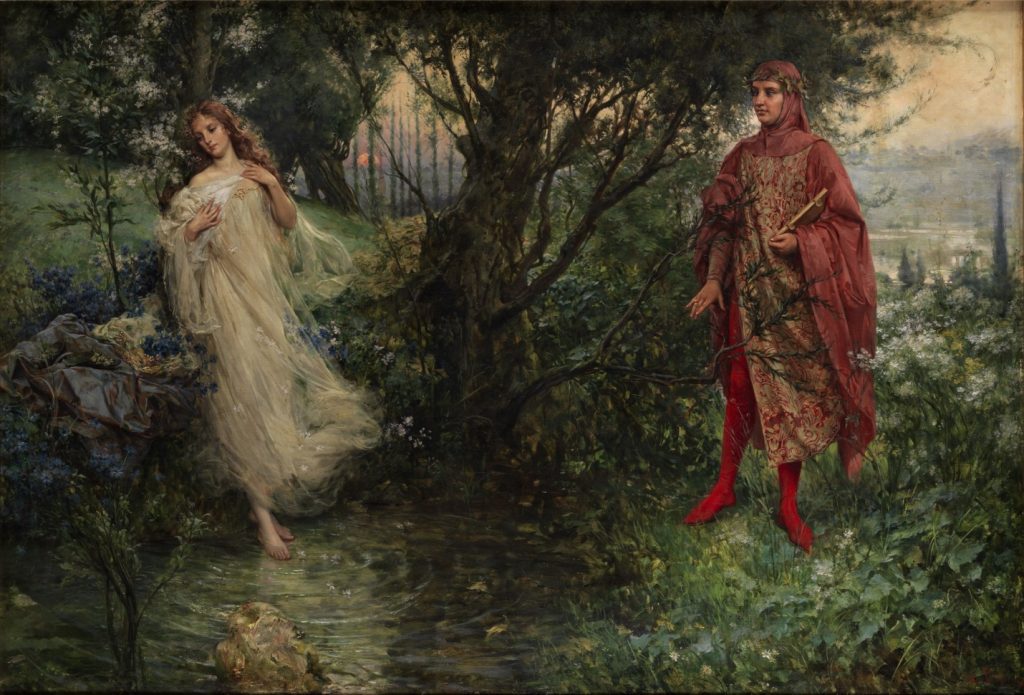As the exchange with Beatrice is continuing, now seen as both Divine Wisdom and Dante’s inner spiritual life, the big question then comes: Why did Dante abandon the spiritual life for such a long time? What happened that made him forget the spiritual connection from his early life, and then let it fade away and be replaced by false frameworks that gave so much less?
As Dante examines himself more deeply to find the exact mechanics, the starting point becomes this: It does not matter for the Heavens if he admits his failings or not, in terms of understanding from “above”. In the bigger picture the reasons are already well known. But the inner dynamics of identifying and admitting the mistake is essential, for letting the Heavens start its work of removing the sin with its “wheels”, and thus removing the “cut” (taglio).
Meaning; the confession and admittance is in part an interior function, to open and repair the relationship with God. This in some ways frames the process differently for the pilgrim.
Then comes the basic question: The joys of nature and art never gave the same heights as the spiritual life and experiences. So what exactly did Dante try to replace it with, when Beatrice “died” (meaning the spiritual life disappeared)? This becomes a device to start searching through one’s own memory and discern, both for the pilgrim and to some extent the reader as well.
At the first arrival of insufficient or lower frameworks, Dante should have lifted his sights back to the spiritual life for the fuller cosmology, and not have waited for some new and better “blow”, or aimed for secular-profane philosophy, or other “vanities” (also as meaningless things) – perhaps suggesting personal fame and glory.
And then comes the technical understanding for the Pilgrim; it is expected for young fledglings to fail a couple of times, and not see the difference between the counterfeits of lower goods or partial frameworks, but for a matured bird, one fully “feathered”, neither nets nor arrows should be able to capture it.
So in a way, Dante is moving towards a reconciliation with his past and his mistakes, through first realizing the mechanical aspects of growing up and maturing as a human being. One might have clear spiritual experiences in the beginning, but through adolescence and younger adult life one might easily be deceived, simply from lack of experience – and not being able to tell the difference between a deeper truth and a seemingly brilliant idea.
In Dante’s case this is likely the period from his early 20s, until early 40s. He is explicit that the spiritual life was gone when he was 35, in 1300. Most likely it was recovered and he converted around 1306/07, during the Malaspina years, at around 42. And his falling away from the spiritual, metaphorically here as Beatrice’s death, which in real life happened when he was around 25 yrs, is likely the time when he pursued secular philosophy, Greek Philosophy and Mythology, early Roman Pagan Virtue, and the Greek and Roman Epics for wisdom and a complete cosmology.
Dante retains much of the richness from these years, but later admits – that they lack the bigger spiritual dimension, and thus fail as overall cosmologies. They are simply incomplete, and thus in many cases misleading or even blocking the deeper truth and understanding of full reality.
So in short; The Pilgrim has to face his earlier failings, but is helped to understand why it happened. It does not remove his personal responsibility for the wrong choices, but it does shed some light upon why this is a common process. And before he is ready to admit his failed choices, as the interior confession and threshold, this recognition and new insight helps him. And at the same time, it has big implications in terms of understanding human nature, growth, maturation, the role of culture and society in acknowledging these dynamics and also allowing for them, while still maintaining an overall healthy view and frame. A frame that is aligned with Transcendent Truth and the bigger reality, and one that ultimately still aims for the bigger view and an aspiration up towards growing unity, with the Heavens.

